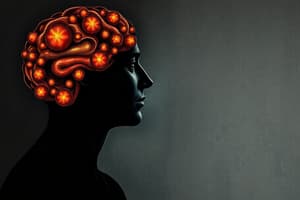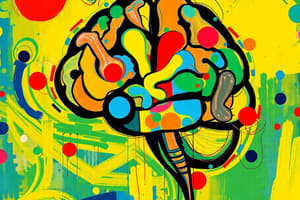Podcast
Questions and Answers
Quel type d'erreur est caractérisé par une réponse comme 'ça avance sur la mer' pour désigner un bateau?
Quel type d'erreur est caractérisé par une réponse comme 'ça avance sur la mer' pour désigner un bateau?
- Paraphasie verbale
- Néologisme
- Erreur d'omission
- Circonlocution périphrase (correct)
Quel diagnostic a été posé à propos du patient RGB après son AVC?
Quel diagnostic a été posé à propos du patient RGB après son AVC?
- Aucune atteinte neurologique
- Hémiplégie dense avec incapacité à se déplacer (correct)
- Discours fluent sans errreurs
- Progression vers la guérison complète
Dans le cas du patient KE, quel est le principal constat fait lors de l'entretien?
Dans le cas du patient KE, quel est le principal constat fait lors de l'entretien?
- Absence totale de paraphasie
- Erreur phonémique fréquente
- Discours limité à des noms simples (correct)
- Discours fluide et sans erreurs
Quelle paramètre est constaté chez le patient RGB par rapport à sa compréhension?
Quelle paramètre est constaté chez le patient RGB par rapport à sa compréhension?
Quelle type de paraphasie se manifeste lorsque le patient dit 'péniche' au lieu de 'bateau'?
Quelle type de paraphasie se manifeste lorsque le patient dit 'péniche' au lieu de 'bateau'?
Quel élément est absent lors des observations de discours du patient KE?
Quel élément est absent lors des observations de discours du patient KE?
Quel type d'erreur est défini par des réponses comme '/bakro/' pour un mot cible?
Quel type d'erreur est défini par des réponses comme '/bakro/' pour un mot cible?
Quels sont les effets d'une atteinte fronto-pariétal gauche observés chez les patients?
Quels sont les effets d'une atteinte fronto-pariétal gauche observés chez les patients?
Quel est le principal problème affecté par l'aphasie Broca ?
Quel est le principal problème affecté par l'aphasie Broca ?
Quelle erreur typique peut se produire chez un patient atteint d'aphasie de production ?
Quelle erreur typique peut se produire chez un patient atteint d'aphasie de production ?
Quelle région du cerveau est principalement impliquée dans l'aphasie de Wernicke ?
Quelle région du cerveau est principalement impliquée dans l'aphasie de Wernicke ?
Quel type d'erreurs se produit lors de la lecture chez les patients avec une aphasie ?
Quel type d'erreurs se produit lors de la lecture chez les patients avec une aphasie ?
Qu'est-ce qui est relativement préservé chez les patients avec aphasie Broca ?
Qu'est-ce qui est relativement préservé chez les patients avec aphasie Broca ?
Quel est le rôle du lexique orthographique dans le processus lexical ?
Quel est le rôle du lexique orthographique dans le processus lexical ?
Quel est le symptôme souvent trouvé chez les patients avec aphasie Wernicke ?
Quel est le symptôme souvent trouvé chez les patients avec aphasie Wernicke ?
Quelle affirmation concernant l'aphasie est incorrecte ?
Quelle affirmation concernant l'aphasie est incorrecte ?
Flashcards
Aphasie
Aphasie
Altération du langage sans paralysie des organes de l'articulation, due à une lésion cérébrale, entrainant une perte de la compréhension et/ou de l'usage des signes linguistiques (parlés ou écrits).
Aphasie de Broca
Aphasie de Broca
Troubles de la production du langage (motrice, non fluente), avec une bonne compréhension.
Aphasie de Wernicke
Aphasie de Wernicke
Troubles de la compréhension du langage (sensorielle, fluente), avec une production souvent fluide mais incompréhensible.
Paraphasie
Paraphasie
Signup and view all the flashcards
Paralexie
Paralexie
Signup and view all the flashcards
Paragraphie
Paragraphie
Signup and view all the flashcards
Lexique phonologique
Lexique phonologique
Signup and view all the flashcards
Lexique orthographique
Lexique orthographique
Signup and view all the flashcards
Erreur d'omission en dénomination d'image
Erreur d'omission en dénomination d'image
Signup and view all the flashcards
Circonlocution
Circonlocution
Signup and view all the flashcards
Paraphasie verbale
Paraphasie verbale
Signup and view all the flashcards
Paraphasie sémantique
Paraphasie sémantique
Signup and view all the flashcards
AVC
AVC
Signup and view all the flashcards
Hémiplégie
Hémiplégie
Signup and view all the flashcards
Lésion fronto-pariétal gauche
Lésion fronto-pariétal gauche
Signup and view all the flashcards
Compréhension sémantique lésée
Compréhension sémantique lésée
Signup and view all the flashcards
Study Notes
Evaluation of Lexical Disorders
- Aphasia: A Greek term (a- privative followed by the root phasis) implying the loss of speaking ability.
- CNRTL definition: A more or less severe impairment of language function, without paralysis of articulation, where individuals experience a communicative loss due to damage to the nervous system, affecting their ability to understand and/or use linguistic signs spoken or written.
Types of Aphasia
- Broca's Aphasia (motor, non-fluent): Characterized by difficulties producing language, but with relatively preserved comprehension and conceptualization. Caused by damage to the frontal-parietal or frontal left hemisphere, specifically Broca's area. Often includes agraphia (writing difficulty) and oral reading difficulties.
- Wernicke's Aphasia (sensory, fluent): Patients have difficulty understanding words or recognizing symbolic representations (auditory, visual, tactile). This stems from a lesion in the posterior superior temporal gyrus of the dominant hemisphere (where language processing generally occurs). Commonly associated with alexia (reading difficulty).
Types of Lexical Errors
- Errors in Broca's Aphasia: Present in the linguistic production of speech.
- Paraphasia: Mispronounced words in spoken language.
- Paralexia: Errors in identifying/producing words during reading.
- Paragraphia: Errors in written language production.
Lexical System
- Model: The model outlines the lexical system used in tasks such as dictation, oral naming of images, and reading aloud.
- Components:
- Input: phonological & orthographical (entries).
- Processing: structural description & semantic systems.
- Output: phonological & orthographical (related to speech production)
- Comment: The model posits separate phonological and orthographic lexicons to accommodate how words are processed in reading/writing and speaking. This allows for independent retrieval of words from these separate representations.
Errors in Image Naming
- Omissions: Failure to produce the correct name.
- No response: Complete lack of a verbal response.
- Circumlocution/Periphrasis: Describing the item instead of correctly naming it.
- Other errors: Incorrect word substitution (paraphasia), verbal and semantic errors, formal errors, non-verbal errors, phonemic errors, and neologisms.
Case Studies (e.g., Patient RGB and KE)
- Case details: Provided as example cases demonstrating characteristic aphasia symptoms and cognitive profiles determined by testing (e.g. auditory and written naming).
- Testing: Data often presented as percentages of various types of errors.
- Results: Findings suggest specific difficulties in language, like impaired semantic systems or phonological retrieval, impacting understanding and usage, and affecting comprehension or production in various modalities. Differences between patients show variations in the extent and location of damage.
General Comments
- Aphasia classifications, case studies, and testing methods are used to analyze the deficits in language use and understanding arising from specific brain damage.
- The underlying assumption is that there are distinct (but interacting) processes behind word retrieval/use, and comprehension. Damage to specific processes/areas will have different effects.
Studying That Suits You
Use AI to generate personalized quizzes and flashcards to suit your learning preferences.





